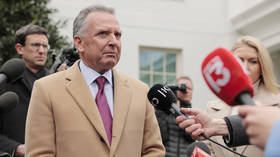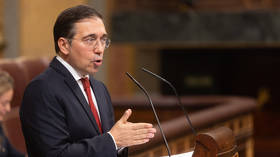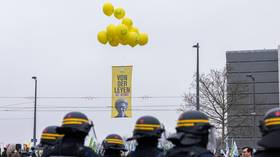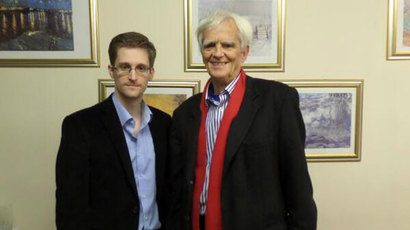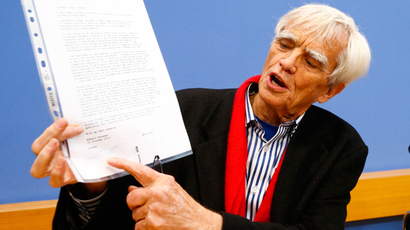Snowden will help Germany investigate NSA spying if granted asylum – report

Edward Snowden is offering Germany his help with investigating NSA spying activities on its soil, if Berlin grants him political asylum, Stern reports, citing correspondence with the whistleblower.
“I have a great respect for Germany,” Snowden wrote to the German Stern publication. The former NSA contractor also wrote that he would be willing to help German officials investigate alleged NSA spying in Germany, if he is granted asylum.
Not fearing possible prosecution and extradition to the US, the whistleblower noted that no one in the German government seriously believes that the US will “implement sanctions against Germany in response to criticism of illegal surveillance” because it will cause “greater harm to the US rather than Germany.”
Snowden doubts the ability of US Congress to implement any reforms, following a report by an expert panel tasked with reviewing NSA global surveillance activities released by the White House earlier this week. The Secret Service Committee, Snowden wrote, is praising the intelligence services rather than keeping them in check.
Last week Snowden sent a similar open letter to Brazil, offering his help with “investigations into suspected crimes against Brazilian citizens” but noting that the US government will continue to limit his “ability to speak out until a country grants me permanent political asylum.”
Snowden again reiterated the message on Sunday in an email
exchange with the Brazilian Globo TV channel, saying that he
would like to move to Brazil if he was permitted by its
government. The Brazilian foreign ministry said that it can only
consider such a request for asylum once it receives an official
application.
He accused the US presidential panel tasked with reviewing US’s
surveillance practices of recommending “cosmetic
changes.”
“Their job wasn’t to protect privacy or deter abuses, it was to
‘restore public confidence’ in these spying activities. Many of
the recommendations they made are cosmetic changes,” Snowden
said, as quoted by Wall Street Journal.
Snowden also managed to thank Russia for the asylum opportunity
and for the ability to freely speak his mind.
"I am grateful for the opportunity to live in freedom and
participate in major global debates through the year asylum
granted by Russia," Snowden said in an interview.
“I have a lot of time for reading, I have been closely following
the developments in the world," said Snowden, responding to
a question about how he passes his time in Russia.

Back in November Snowden handed over another letter addressed “to whom it may concern” in German political circles, indicating that he was willing to go to Germany and testify over the US wiretapping of Angela Merkel’s phone on condition of granting him political asylum.
In that one-page typed letter, the whistleblower also expressed hope that “with the support of the international community, the government of the United States will abandon this harmful behaviour [of treating dissent as defection].”
Without commenting directly on the open petition, the US State Department responded by saying, that Snowden remains a wanted man who “is accused of leaking classified information, faces felony charges here in the United States and … should be returned as soon as possible.”
Following Snowden’s November appeal, more than 50 German public figures asked Berlin to grant Snowden asylum, according to Der Spiegel. For instance, the former general secretary of Angela Merkel's Christian Democrats, Heiner Geissler, wrote that Snowden has done the western world a “great service.”
The German government however refused to consider the request, with Steffen Seibert, official spokesman of the cabinet, saying that the issue is tied to Germany’s security and mutual interests with the US. “For us Germans, the transatlantic alliance remains of paramount importance,” he said.
In the meantime, Snowden continues to look for a safe harbor, following the offer for a temporary asylum in Russia in August. Before accepting a temporary asylum in Russia on conditions that he would not engage in whistleblowing activities on Russian soil, the whistleblower sought permanent political asylum in over 20 countries, including Germany and Brazil.
The two states embarked on a UN quest to curb the NSA’s worldwide spying activity, and introduced a UN resolution against supernormal surveillance of communications, which was adopted by the UN General Assembly unanimously.
During this week’s press conference, Russian President Vladimir Putin has once again reiterated that Russian intelligence has never sought to extract any intelligence from Snowden, who in his turn is abiding by the terms of not engaging “in anti-American propaganda.”
“Operationally, we are not working with him and never have done, and are not asking him any questions about how his agency worked on Russia,” said Putin. “I won't hide it, this person is not without interest for me. I think that thanks to Snowden, a lot changed in the minds of millions of people, including in the minds of major political leaders.”


